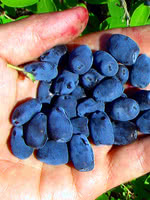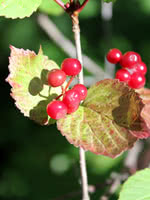Mon-Fri 9am - 5pm Mountain time
Borealis Haskap (Honeyberry) vs Lowbush Cranberry
Lonicera caerulea Borealis
Viburnum edule
NOT AVAILABLE THIS SEASON - MIGHT RETURN
Borealis Haskap is a popular variety due to its great-tasting, sweet-tart berries. The flavour of Haskaps is generally described as a cross between a blueberry and a raspberry. Borealis Haskaps are well suited to fresh eating, baking, and preserves.
It has strong fruit holds and is not very firm so it does not do well when handled by equipment. This variety is a favourite for home gardens and U-Picks.
For optimal fruit production, cross-pollination is required. Haskaps need to be planted with a compatible variety. Compatibility is influenced by both bloom time and genetics.
Borealis Haskap is an early-pollinating variety and pairs well with Aurora and Honey Bee.
Lowbush Cranberry is a short, deciduous shrub native to North America. Its white flowers bear sour but edible fruit that ripens to a brilliant red in fall. Lowbush Cranberry's small size makes it suitable for urban use; buyers will also find it useful if trying to reclaim land back to its original species or when landscaping with native species in damp conditions.

